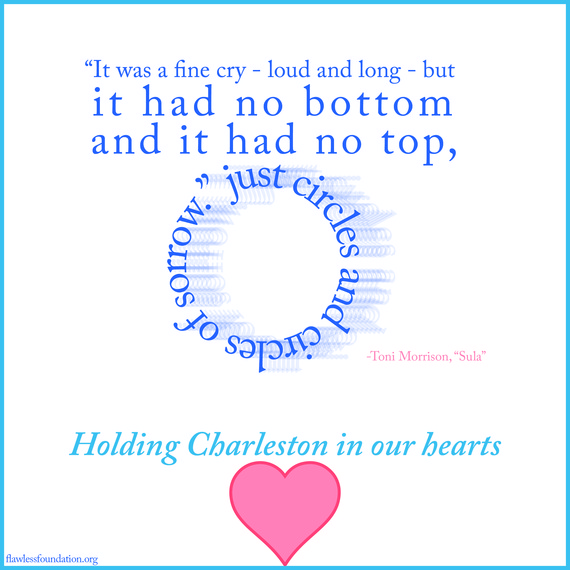I write with a broken heart as we once again stand together as a nation in the grief of a brutal shooting that stuns the world.
Without a doubt, the events that transpired in Charleston, S.C. are tragic, and the premature loss of any life is something we collectively mourn. My heart and mind are with those of the Emanuel African Methodist Episcopal Church where the church community is coming together through the power of love and forgiveness and modeling for us all how to grieve with courage.
I cannot, however, say that this tragedy is having the same unifying effect for the rest of the country.
We must allow for every voice to be heard in this conversation. This is not the result of one political issue over another. Before the handcuffs were clasped on the suspected "shooter," it seemed like every faction in America -- anti-gun rights activists, civil rights advocates, political figures, religious groups, and mental health advocates -- had placed a label on this young man. To be sure, our nation's history of racism and racial violence against African-Americans provides an all-too-recognizable frame for this terrible story. The "shooter" had only been identified for a few moments before he was tried, sentenced, and executed by the public.
We are trained from a young age to judge and label. It is human nature to make split-second decisions that are based on good or evil, right or wrong. But what is the reality? The "shooter," like the victims, is a human being. He is a son, a grandson, a friend. We know very little about Dylann Storm Roof but he could be our child or the boy next door. We have seen glimpses of his online presence and have only fragments of a person that have been patched together to create this all-too-familiar "demon." One thing we know for sure: this young man's brain was not functioning properly, and probably had not been in optimal health for a long time. Another thing we know is that our educational, medical and criminal justice systems need radical reform to help us prevent such tragedy.
Many voices are heard in the media cacophony, with their own perspectives and agendas, and we have lost sight of the reality as a whole. We have factionalized ourselves and "othered" the suspect -- a combination that leads to neither change nor unity. We have allowed yet another person to take away life because we haven't come together to address issues around prevention. We must rewrite this story that keeps repeating itself of not recognizing and addressing the signs of a person in distress. It is criminal in this case that this young man had shared his plans with his friends including intent to kill himself. What are we doing in our schools, in our medical facilities and in our society to make sure that our young people don't fall through the cracks?
At times like this our default is to fall back on the blame game which has only kept us stuck in the same rhetoric: gun control debates and "othering" the disenfranchised who we conveniently forget. Forget until the next horrific event reminds us of our collective failure in another place where all people, young and old, should feel safe together, whether a school, a movie theater or a workplace.
I believe we're close to the day when we can stop asking "why did this happen?" It is on that day that change and unity become possible. It is on that day that mental health will truly be just health and we will have a society that embraces instead of ignores those who are so obviously in need way before tragedy strikes.
We have heroic examples of activism that we should embrace. Last week we were in Boston with the awe inspiring mental health adovcate Nelba Marquez Greene at the Kennedy Forum who lost her daughter Ana Grace in the Newtown tragedy. Nelba and her husband Jimmy decided not to "other" Adam Lanza, but to try and understand what might have motivated him to perpetrate such horror and to take action for radical change. Will we find the power and grace to do the same?
Rumi wrote that "What hurts you blesses you; darkness is your candle."
As the Emanuel AME Church and the people of their community come together to mourn, how will we all find any hope of a blessing in this agonizing trauma? The Marquez Greene family have given the rest of us a glimpse of how to turn the deepest loss into an opportunity for meaningful change with their philosophy that "Love Wins."
Will the rest of us finally take this chance to choose love and light our own candle in the darkness of Charleston?
